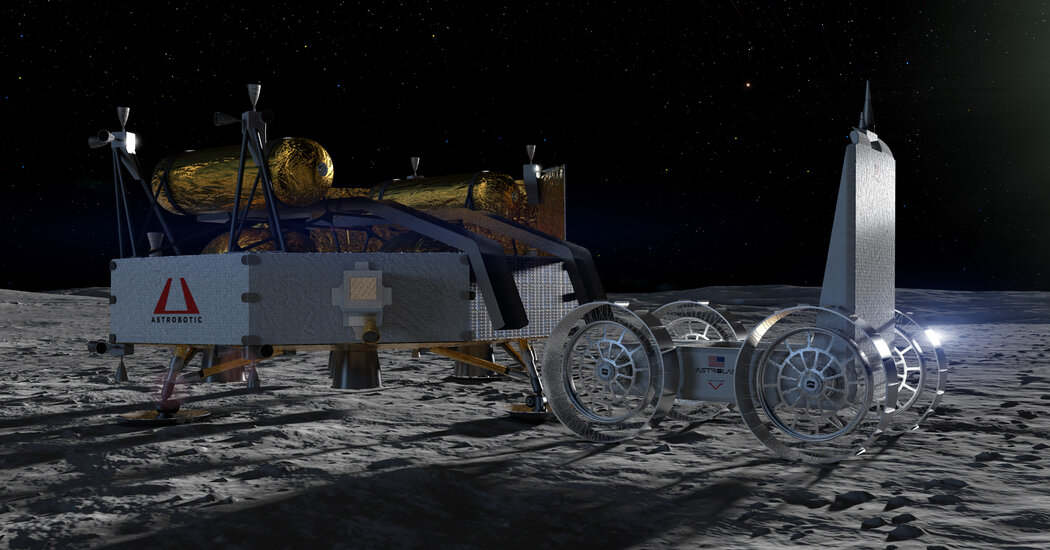NASA’s second thoughts about VIPER opened an opportunity for someone else to book that ride to the moon. Just because its cargo was canceled did not mean Astrobotic’s journey was off — it remains scheduled for later this year. And on Wednesday, a small startup named Venturi Astrolab Inc. announced it had claimed that opportunity to accelerate its own lunar rover plans.
“We’re excited to get actual wheels in the dirt this year and see how all our tech performs,” Jaret Matthews, the chief executive of Astrolab, said in an interview. (Despite the similar names, the two companies are unrelated.)
Many people inside and outside of NASA were perplexed by the cancellation of VIPER, because the rover, while over budget and behind schedule, had been completed. It needed just one more round of testing before it would be ready for launch. NASA officials said that instead, the finished rover would be disassembled.
In addition, they said NASA would still pay $323 million to Astrobotic. Thus, canceling the mission would save NASA a relatively paltry amount — $84 million — after it had spent about $800 million.
For its fee, Astrobotic would conduct the mission as planned, but the lander spacecraft, known as Griffin, would carry a nonfunctional dummy weight instead of VIPER.
NASA officials said that for Astrobotic to perform the landing successfully was in itself a valuable exercise, and that the company was free to sell the payload space on Griffin to another customer if it could, replacing the dummy weight.
“We had more than 60 organizations from around the world knock on our door,” said John Thornton, chief executive of Astrobotic.
Astrolab, he said, was the best match. “They could move fast,” Mr. Thornton said. “They had a payload that matched the interfaces already for the lander.”
The rover that Astrolab will fly on this mission is also roughly the same size as VIPER. Mr. Matthews declined to say how much Astrolab was paying Astrobotic.
Astrolab is developing a rover the size of a Jeep Wrangler that could autonomously drive cargo or people across the moon’s surface. The company calls it FLEX, short for Flexible Logistics and Exploration Rover.
FLEX is much too big and heavy to fit on Astrobotic’s lander. Astrolab has already booked space for FLEX on a future flight of Starship, the gargantuan spacecraft currently under development by SpaceX, the rocket company founded by Elon Musk.
But before sending FLEX to the moon, Astrolab wants to send a smaller, 1,000-pound rover named FLIP — short for FLEX Lunar Innovation Platform — to test technologies like batteries, motors, power systems and communications. A particular goal is studying how to minimize problems caused by particles of lunar dust, which are angular and sharp.
The smaller FLIP is the one that Astrobotic’s Griffin will take to the moon.
Mr. Matthews said FLIP would also carry a couple of commercial payloads that would be announced later.
Despite Astrobotic’s failure last year, Mr. Matthews said he had confidence in Astrobotic. “From our perspective, it’s actually a way to reduce risk for our subsequent missions,” he said. “If we didn’t have full confidence in Astrobotic, we wouldn’t be doing this.”
Mr. Thornton said the past year had been one of introspection for the company. “It’s like the old saying, ‘Whatever doesn’t kill you makes you stronger,’” he said. “I think in this case, it really did.”
Despite NASA’s efforts to kill VIPER, the rover is not dead nor dismantled yet. NASA asked for and received proposals to continue the mission without additional investments from NASA.
The agency expects to make a decision this summer. But with the new Trump administration indicating more interest in Mars than the moon, everything could change soon.
Mr. Thornton said Astrobotic was not worrying about that possibility yet. “There’s certainly a lot of conversation in D.C.,” he said. “But right now we’re focused on what NASA has contracted us to do, and that is to deliver Griffin to the surface of the moon.”
Mr. Matthews said that if NASA indeed made a sharp turn toward Mars, Astrolab could pivot too.
“We’ve always considered ourselves to be a multi-planet business,” he said, “and we would be excited to go to Mars as well.”


